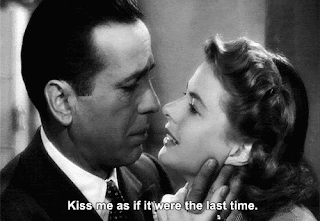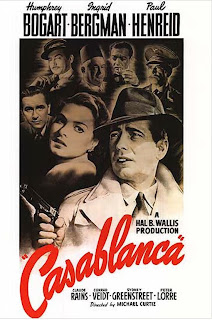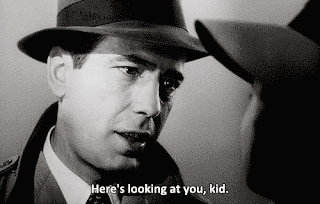Casablanca (1942)
Roger Ebert started his Great Movies selection by writing about Casablanca; therefore, I think it is suitable for me to do the same :-)
Such is the impact Michael Curtiz's Casablanca has had in Western culture that its story is known even to people who may have never really watched it: Rick (Humphrey Bogart), a bitter man who "sticks his neck out for nobody", owns a cafe in Casablanca, French Morocco, a gateway to America during World War II. One night, "of all the gin joints, in all the towns, in all the world", Ilsa (Ingrid Bergman), the woman who broke his heart, walks into his cafe, accompanied by her husband Laszlo (Paul Henreid), a Resistance leader. He needs to flee to America, and for that, he needs some Letters of Transit that happen to be in Rick's possession. Rick must then choose between his love for Ilsa, or helping her and her husband flee to America, so that they can keep fighting against the Nazis.
With a simple Google search, one can quickly find evidence that the movie was being written as shooting went along, and one doesn't need to be a movie critic to know this is a recipe for a subpar, incoherent script. However, against all odds, Casablanca became one of the most influential and quotable films of all time. While not keeping the movie in such high regards, Umberto Eco gives what is, for me, the best reason why that is: Casablanca is not just one film; it is many films, an anthology, a mish-mash of recognizable clichés talking among themselves and celebrating a reunion, which is why it can resonate so deeply with anyone who watches it.
 |
| Rick (Bogart) and Ilsa (Bergman) |
I have watched this movie many times. In my first time watching it, I found it amusing but simply hated the ending. I mean, Rick loves Ilsa, Ilsa loves Rick, Laszlo knows of their past together, Ilsa is nothing but a "helpmate" to Laszlo (as Ebert put it), so, why not, goddammit??? However, the movie up to the final scene is such a fun trip that it made me watch it again and again and, with time, understand and accept that ending; now I can't imagine Casablanca's conclusion being any different. I mean, Rick is introduced as a cynical "citizen of the world" looking exclusively over his own interests, all of this, as implied by the movie, caused by Ilsa's leaving him the way she did (just look at the flashback scene in Paris to see a very different rick than the one that had been shown so far). When he then sees Ilsa again, at first he's pissed, of course (after all, she stood him up on a station platform in the rain, leaving him "with a comical look in his face because his insides had been kicked out"), but gradually he starts to change, depicted for instance in the scene when he helps the young Bulgarian couple to make enough money in his clandestine casino in order to buy their exit visas from Captain Renault (Claude Rains). That scene alone gives away the ending, with Rick realizing that "the problems of three little people don't amount to a hill of beans in this crazy world", renouncing Ilsa so that she can keep on supporting Laszlo in his fight, sacrificing his own happiness for a greater good. Recently, I've read an essay by Glen and Krin Gabbard where, although with a touch of Scrotie McBoogerballs, they make the good point that, as the audience has been manipulated into identifying with Rick, the act of him selflessly giving up the love of his life to join de Gaulle would resonate better with a 1943 audience (the US having, then, officially become involved in World War II two years earlier), which makes total sense.
 |
| Tonnelli (left) and Casselle (right) |
Talking about Casablanca subtitled in Japanese, man, what a boring, boring version that is! The last time I've watched it was with my current (as of this writing :-P ) girlfriend, who is Japanese and can't speak English. It was her first contact with the movie (as Japan is an island in more than the literal meaning of the word), and she found it to be utterly dull. Why? One simple reason: there is no notion of sarcasm in the Japanese language; everything is understood literally. In fact, whenever sarcasm is subtitled in Japanese, it is explicitly marked by dots over the ideograms, so people know not to interpret it literally. The main problem is, 9 out of 10 sentences uttered by Rick are filled with sarcasm! Because of that, as practically all of his lines would have the said dots, the Japanese translator must have just said "fuck that shit!", and removed *ALL* sarcasm from the film, thus removing a great deal of its charm in the process...
 |
| Ingrid Bergman: Casablanca (left) and For Whom the Bell Tolls (right) |
A funny thing I found out is that, although now it's unthinkable to think about Casablanca without Sam (Dooley Wilson) playing "As Time Goes By",Max Steiner, the movie composer, simply hated it. Having been adapted from Murray Burnettand and Joan Alison's unproduced play Everybody Comes to Rick's, that music just came with the package, with nobody making the conscious decision of including it. In fact, Steiner hated it so much that he convinced the the producer to change it and record a new song! Unfortunately for him, Bergman had already left the production to prepare for her role in For Whom the Bell Tolls, which required her to cut her hair short. As she must have looked hideous wearing a wig, Steiner saw himself with no way out but keeping the song, and, maybe out of spite, ended up making it the centerpiece of the movie's score.
Another interesting piece of trivia deals with the Marseillaise scene. To make Casablanca believable as a port town, extras with a very diverse ethnic background were hired by the producers, and many of those extras happened to be European refugees, who happened to have left family and friends in a 1940's Europe occupied by the Nazis. This means that the tears of hope they shed while singing the Marseillaise were not staged at all, as there was still no prospects of and end for the war...
Liked
|
Didn't like
|
|---|---|
Sarcasm at its finest makes Rick (and the movie) great to watch.
|
The ending, at first. Like it a lot now, and believe the movie would not work as well without it.
|
No backstory for Rick. Sometimes less is more, and by not explaining Rick's backstory, it makes him even more mysterious and interesting as a character.
|
It's hard to like Laszlo. Hard to say if it's the fault of actor Paul Henreid or the script favoring Rick...
|
| Dooley Wilson singing As Time Goes By. |
Well, that's it for my first comment out of nearly 400 movies I intend to watch. I don't have nearly as much talent as Ebert to end this thing with a witty remark, so I won't even try; I'll let Bogart say it for me.
Great Movie review by Roger Ebert here.
If you liked this movie, then maybe try watching John Huston's The Maltese Falcon (1941), and Charles Vidor's Gilda (1946).





best war & love movie ever <3
ReplyDelete